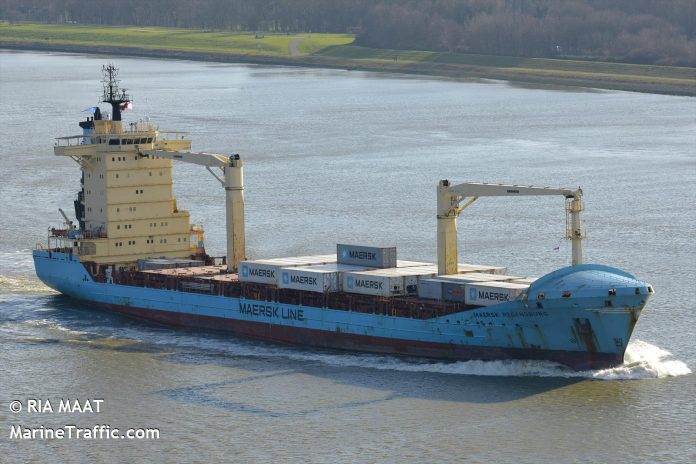A container vessel, the Maersk Regensburg, became the latest victim of an attack today as poverty and organised crime combine to make a dual threat to vessel operators in the West African region.
According to the latest reports from Dyad Global the Hong Kong registered Regensburg was boarded by a single individual, but the crew raised the alarm was raised and the “intruder fled the vessel in a small boat with an outboard motor. It is understood that the thief had removed a single lashing bar from a cargo container before he was discovered.
Dryad Global said, “This is only the second incident in this location, at the Banana Anchorage off the Congo, within the last 12 months. Incident reporting within this area remains sparse and limited to boarding for theft.”
However, an increase in pirate activity off the West African coast in general has been seen pilfering events through to the more serious organised and sophisticated pirate attacks further out to sea where crew can be attacked and kidnapped with machetes and guns, according to Munro Anderson of Dryad Global.
“The difference is similar to the kind of street crime you see on land with muggings from individuals or organised kidnapping, the petty crime is a consequence of poor socio-economic conditions and can be seen around the world where those conditions prevail,” explained Anderson.
Dealing with this low-level pilfering is difficult and would probably require the eradication of the poverty that drives individuals to that kind of crime added Anderson.
More serious attacks are perpetrated out to sea and are also more limited to the West African states which have an offshore infrastructure, such as Angola, Gabon and north to Nigeria. Although there have been only a few serious incidents, their number is increasing.
Dealing with this kind of piracy normally requires some form of international engagement along with the will by West African states to protect offshore industry projects.
“Most West African states are faced with a dilemma, they only have the resources to protect the coastal regions or to project their power to the offshore domain,” explains Anderson. Most in this instance will protect the coastal regions, that means that the offshore region remains unprotected unless foreign powers are ready to deploy assets to protect commercial shipping as was the case in the Gulf of Aden with Somali pirates on the East African coast.
Portugal, Italy and France all have interests in West Africa, a throwback to their imperial past, but none has deemed the piracy problem sufficiently problematic to extend any naval response to the region.
India, which has seen approximately 67 nationals kidnapped in the region has not seen fit to protect crew from attack, “If 67 UK nationals had been kidnapped I would be willing to bet the UK would send help,” said Anderson.
In addition, Anderson points out that there is no added impetus for a broader collaboration in the West African region, as there is in the Gulf of Aden.
“The geo-political narrative is not there in West Africa,” Anderson admitted, “and there’s unlikely to be any change in the short to medium term, the West African states need to be more organised to present a co-ordinated response, but they are frustrated by bureaucracy,” added Anderson.
Nick Savvides
Managing Editor







